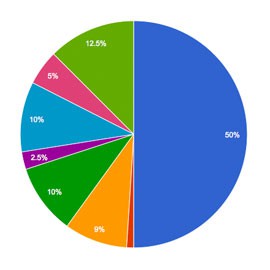Cronkite News has moved to a new home at cronkitenews.azpbs.org. Use this site to search archives from 2011 to May 2015. You can search the new site for current stories.
School-tax proposition raises question of funding via voters or lawmakers
PHOENIX – Is deciding how to fund education in Arizona best done by lawmakers or voters?
That’s a key point of debate with Arizonans ready to decide whether to adopt a permanent 1-cent per dollar sales tax that would be earmarked primarily for education but also for human services and transportation.
The money raised, estimated at $1 billion in the first year, would be off limits to state lawmakers.
Arizona State Treasurer Doug Ducey, chairman of a political committee opposing Proposition 204, said allocating resources is best left to the Legislature.
“This takes power away from the democratic process and puts the decisions in the hands of unelected, unaccountable bureaucrats,” he said.
But state Rep. Steve Farley, D-Tucson, said the measure is necessary precisely because the GOP-controlled Legislature has failed to adequately fund education in recent years.
“We have to make up for things that this majority has decided to take away from our schools,” Farley said.
Because of the Voter Protection Act, a ballot measure approved in 1998, lawmakers aren’t allowed to overturn voter-approved initiatives. And changes that advance the cause of a ballot measure require a three-quarters vote of the Legislature.
E.J. Perkins, a policy analyst with Arizona State University’s Morrison Institute for Public Policy, said that protects the will of voters but also makes changes difficult if a legitimate need arises.
“If you have a very complex ballot proposition that might warrant a full vetting. It might not get that if it’s coming from a ballot initiative,” he said. “If it passes, we might have to live with it.”
Kevin McCarthy, president of the Arizona Tax Research Association, said the citizen initiative process takes away the safeguards of the legislative system, in which bills are read and vetted multiple times.
“When you’re running an initiative a very small group of people get to draft legislation,” McCarthy said. “Inevitably you are going to have not only policy problems but problems with how it is going to be written.”
He said the problems with Proposition 204 include not planning enough for inflation and difficult-to-administer provisions.
Rep. John Kavanagh, R-Fountain Hills, chairman of the House Appropriations Committee, said that if the initiative passes it could interfere with legislators’ ability to make adjustments in the budget.
“So if we have another economic downturn, next year or in five years, we will have amply funded education and will be stopping other programs,” Kavanagh said.
Some of that concern centers on what supporters call a funding floor. That provision would prevent lawmakers from reducing per-student and capital appropriations for K-12 education and general fund appropriations for higher education from fiscal year 2011-2012 or 2012-2013, whichever is higher.
“Whenever you say we are never going to spend less, no matter what, that’s a recipe for disaster,” said Jonathan Butcher, education director at the Goldwater Institute, an independent watchdog group that promotes limited government and free enterprise.
Kavanagh said the Legislature has already started restoring education funding and will continue doing so if the initiative doesn’t pass.
“I think we need to trust the Legislature, who gets to look at the entire budget issue and not just education,” he said.
But trusting the Legislature to adequately fund education is the last thing in initiative’s advocates say they are ready to do.
Ann-Eve Pedersen, chairwoman of the political committee pushing for Proposition 204, said that while education is Arizona voters’ top priority lawmakers haven’t invested enough in recent years.
“If the Legislature were willing to reinvest in education, then this proposition would be completely unnecessary,” Pedersen said.
Proponents have pointed to a recent report by the Center for Budget and Policy Priorities, a national policy group, ranking Arizona last among 48 states measured on per-student spending decreases since 2008.
George Cunningham, the pro-204 campaign’s volunteer treasurer and a former state senator, said the initiative wouldn’t affect the ability of lawmakers to budget but would ensure a minimum funding level for schools.
“We did not impose constraints upon the Legislature’s ability to move money around within the K-12 system,” Cunningham said.
Farley, the Tucson representative, said that while the ideal scenario would be for voters to elect lawmakers who support more education funding an initiative is necessary in this case.
“Given the recent history of the Legislative majority, I think somebody has to do it and the people might as well do it,” he said.







